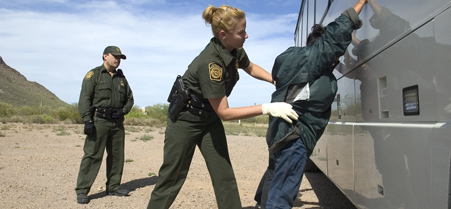Poor contractor oversight plagues virtual border fence project
Inspector general says Homeland Security has too few managers to properly check on the cost and progress of SBInet.
 A Customs and Border Patrol agent pats down a woman before returning her to Mexico.
A Customs and Border Patrol agent pats down a woman before returning her to Mexico.
A troubled program to install sensors and cameras to detect illegal immigrants entering the United States from Mexico experienced severe cost overruns and delays because Homeland Security Department officials did not properly check up on the contractor's work, according to an inspector general report released on July 9.
The report is the latest blow to SBInet, the technology component of DHS' Secure Border Initiative, which includes a network of sensors, cameras, radar and control towers that was being built to detect individuals crossing into the United States from Mexico. The department awarded the initial $2.5 billion contract to Boeing Co. in September 2006, and as of February 2010 had awarded the company 13 task orders worth approximately $1.2 billion.
The DHS inspector general reviewed four task orders awarded in fiscal 2008 to determine whether the department's program office had implemented adequate controls for avoiding cost overruns and meeting milestones. But the auditor found Customs and Border Protection had "to improve its control of contractor activities on the SBI technology program."
Specifically, program officials did not ensure contractors maintained up-to-date information in the project's management software tool designed to alert managers to potential cost overruns and program delays, according to the report.
"Without accurate baseline information to reflect cost and schedule variances, management is hampered in its ability to make viable operational decisions," the inspector general said. The report noted that since the audit, CBP has put in place surveillance measures to ensure contractors keep the agency informed of progress.
Program officials also failed to ensure that one milestone was properly completed before progressing to the next phase, increasing the risk of significant rework and associated project delays, according to the report. DHS managers also did not document reviews and acceptances of the contractor's progress.
"The absence of updated baselines and documented events review and acceptance dates makes it difficult for the government to hold contractors accountable for not meeting time frames or not making progress toward accomplishing acquisition expectations," the inspector general said. "Also, improper closeout of program events increases the risk of project delays and wasted resources."
The audit said too few federal managers was a primary reason for the lack of contractor oversight. At the time of the audit, the SBInet Program Office had only two schedule analysts and one earned value analyst to ensure milestones were met on time.
"Since early stages of the SBInet acquisition, the program office has faced challenges in maintaining adequate staffing," the inspector general said. "In addition to these challenges, the SBI program officials stated that the initial assumption that commercial off-the-shelf technology would be available to cover SBInet needs, serving as a basis for determining staffing requirements, ultimately proved to be wrong."
DHS agreed to the inspector general's recommendations to develop a process to document government review and acceptance of program accomplishments, and ensure milestones have been properly completed and issues addressed before proceeding with subsequent program events. Program officials also agreed to reevaluate the SBInet program staffing plan to better meet the need.
Their actions depend on whether SBInet survives . Earlier this year, DHS Secretary Janet Napolitano froze spending and ordered an assessment of the program to determine if it should continue.
NEXT STORY: Defense Continues Apps Pursuit





